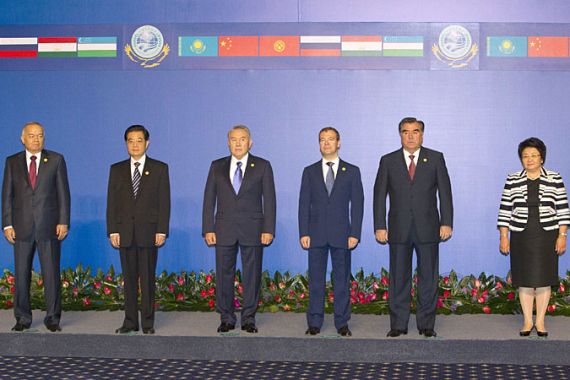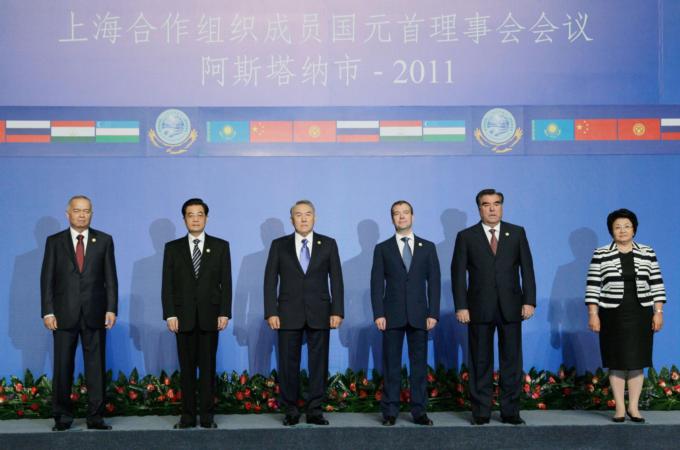Beijing and Moscow beyond the SCO summit
China and Russia struggle for influence over Central Asian economies, but see eye-to-eye on other geopolitical issues.

 |
| The Shanghai Cooperation Organization (SCO) includes rising Asian countries but traditional western powers have not been invited to join [EPA] |
So what really happened at the annual summit of the Shanghai Cooperation Organisation (SCO), last week in Kazakhstan?
Compared to expectations at fever pitch, it was a rather measured affair; more of a road map than a game-changer. Still, China, Russia and four Central Asian “stans” – Kazakhstan, Kyrgyzstan, Tajikistan and Uzbekistan – went way beyond a predictable security/economic cooperation menu.
After all, summit host and president of “snow leopard” Kazakhstan, Nursultan Nazarbayev, detailed the SCO will keep fighting terrorism and cyber-narco-criminality, while trying to solve the delicate issue of the distribution of water in Central Asia – a key chapter of the upcoming global water wars.
But he also advanced the SCO is in favor of a new global currency. And it gets juicier; a new memorandum stated the SCO now starts consultations with India, Pakistan and Iran – which have all applied for full membership.
That’s not a done deal though. Iran wants to be a member since 2008. But it hasn’t been accepted because it is under Western-pushed UN sanctions.
Pakistan, on the other hand, was itching to be included – via effusive SCO praise unleashed by President Asif Ali Zardari. A welcoming SCO certainly beats a serial invader, drone-junkie Washington.
Beijing though will have to be very careful when balancing admission by both India and Pakistan. According to Wu Hongwei of the Chinese Academy of Social Sciences, “if they joined the SCO, they are likely to bring their unsolved disputes into the organisation.”
Afghanistan, for its part, has applied for observer status. That will be easily granted. And that’s when the game will become even more engaging.
Make profit, not war
To track reactions on Chinese and Russian media has been no less than fascinating. For many critical minds in Moscow, uneasy because Russia seems to be unable to diversify its economy, the SCO is now fundamentally Chinese.
They have a point. Although bilateral trade is booming, for the collective leadership in Beijing Moscow is seen as little else than a giant energy/commodities provider for the dragon; Moscow for its part badly wants/needs high-tech Chinese investment in its battered industrial sector.
Russia and China have a bilateral strategic programme through 2018. It basically involves development/production of oil, gas and minerals in Russia – Siberia and the Far East – and processing in China.
The key Pipelineistan name of this game is the immense Eastern Siberia-Pacific Ocean (ESPO) oil pipeline – and its offshoot from Russia’s Skovorodino to China’s Mohe, plus two gas pipelines.
What Pipelineistan obscures is the very sensitive theme of who will be top economic dog in Central Asia. You don’t need to be a weatherman to see which way these steppe winds are blowing. How to find a balance between Russia’s strategic game in Central Asia and China’s economic voracity?
For instance, the SCO wants to create a development bank. Moscow wants to link it to the Eurasian Development Bank – whose major partners are Russia and Kazakhstan. Beijing wants a brand new mechanism.
Yet on a geopolitical level, it’s another story altogether.
Beijing-controlled media was ecstatic as China and Russia deepened their strategic partnership only one day after the SCO summit, with a joint declaration by China’s President Hu Jintao and Russia’s Dmitry Medvedev.
Instead of NATO bombing, Russia/China favor “non-interference” and “less military action” in Korea and especially in MENA (Middle East/ North Africa).
Instead of Washington meddling in problems between China and some Southeast Asian countries, Russia/China favour their “strategic partnership” as a “key factor in the peace and stability of the Asia-Pacific region”.
Instead of Washington’s missile defense plans for Eastern Europe, Russia/China privilege “political and diplomatic solutions”.
Instead of demonisation, Russia/China stress Iran has a right to develop a civilian nuclear programme.
And it goes without saying that apart from opposing NATO’s bombing of Libya, Russia/China is against any possible UN Security Council resolution on Syria.
To say that none of this will go down very well in the White House and the State Department, not to mention the “Full Spectrum Dominance” Pentagon, is of course an understatement. The cherry on the cake was another declaration by Hu and Medvedev; China and Russia will step up military cooperation.
Another break in the wall
And then there’s the Rosebud in this “Citizen Eurasia” movie – the endless quagmire at the Afghan crossroads. Washington is on a major PR offensive trying to convince world public opinion that because NATO is “winning”, talks with the Taliban are in order.
What next? Mullah Omar as guest of a Kabuli rice state dinner at the White House?
Reality is slightly more complex. Wily Afghan President Hamid Karzai was at the SCO summit, lobbying for his country’s observer status. He knows that no realistic solution for Afghanistan will come from Washington. It will have to involve the SCO.
Kazakh “snow leopard” Nazarbayev actually gave the game away, when he said, “It is possible that the SCO will assume responsibility for many issues in Afghanistan after the withdrawal of coalition forces in 2014.”
The first part of the comment is correct; not the second, because for the Pentagon abandoning Afghanistan is simply unthinkable – according to the Full Spectrum Dominance doctrine.
Yet ask anybody in the whole arc from Central to South Asia; nobody wants permanent US military bases in Afghanistan. Apart from public opinion, this also happens to mean all members of the SCO – plus the observers.
One would never find a mention of it in a SCO declaration, of course; but Beijing and Moscow are convinced that if Washington has its way in the Hindu Kush it will deploy missile defense inside Afghanistan – pointed, of course, against both Russia and China.
So fasten your seat belts; geopolitically, China and Russia will get closer and closer all across Eurasia – no matter the PR about a US-Russia “reset”.
That’s the “invisible” message carried by the SCO for the immediate future; paraphrasing Pink Floyd, we don’t need no intervention, we don’t need no thought control. That’s how Russia/China plan their long march to break the Pentagon/NATO wall.
Pepe Escobar’s latest book is Obama Does Globalistan (Nimble Books, 2009). He may be reached at pepeasia@yahoo.com
The views expressed in this article are the author’s own and do not necessarily reflect Al Jazeera’s editorial policy.
